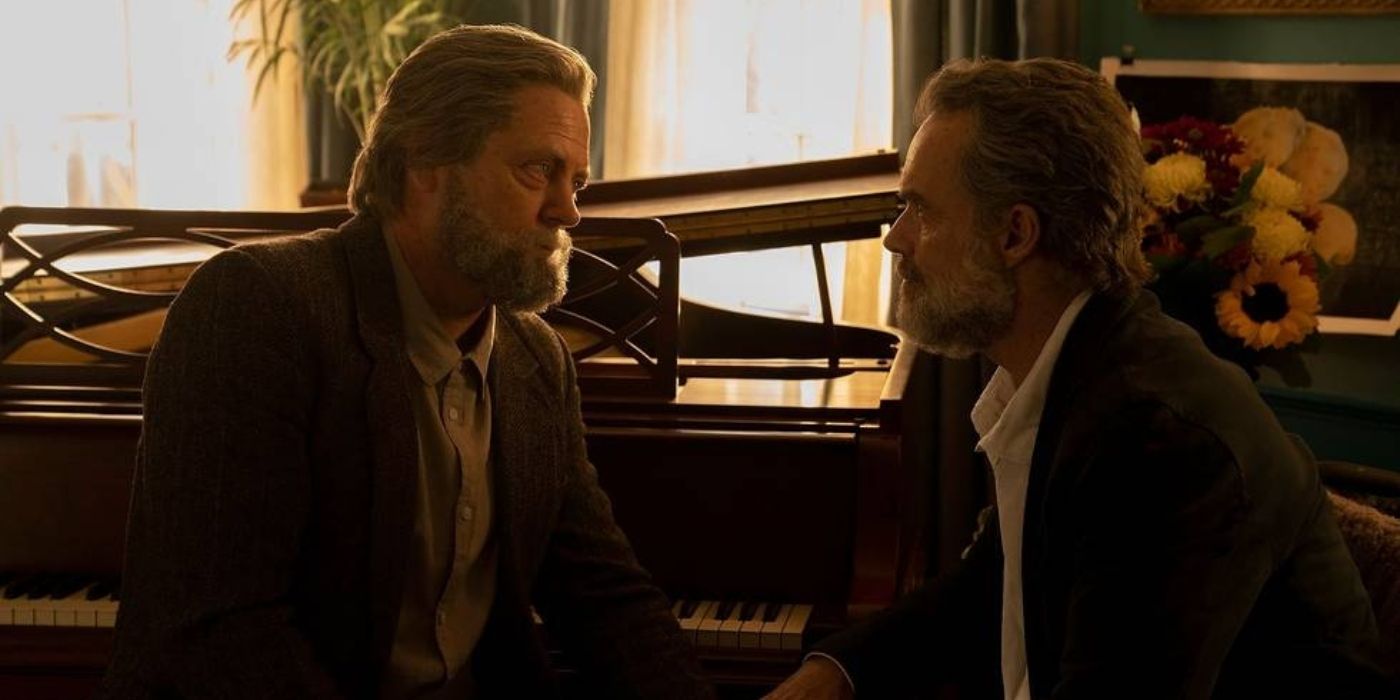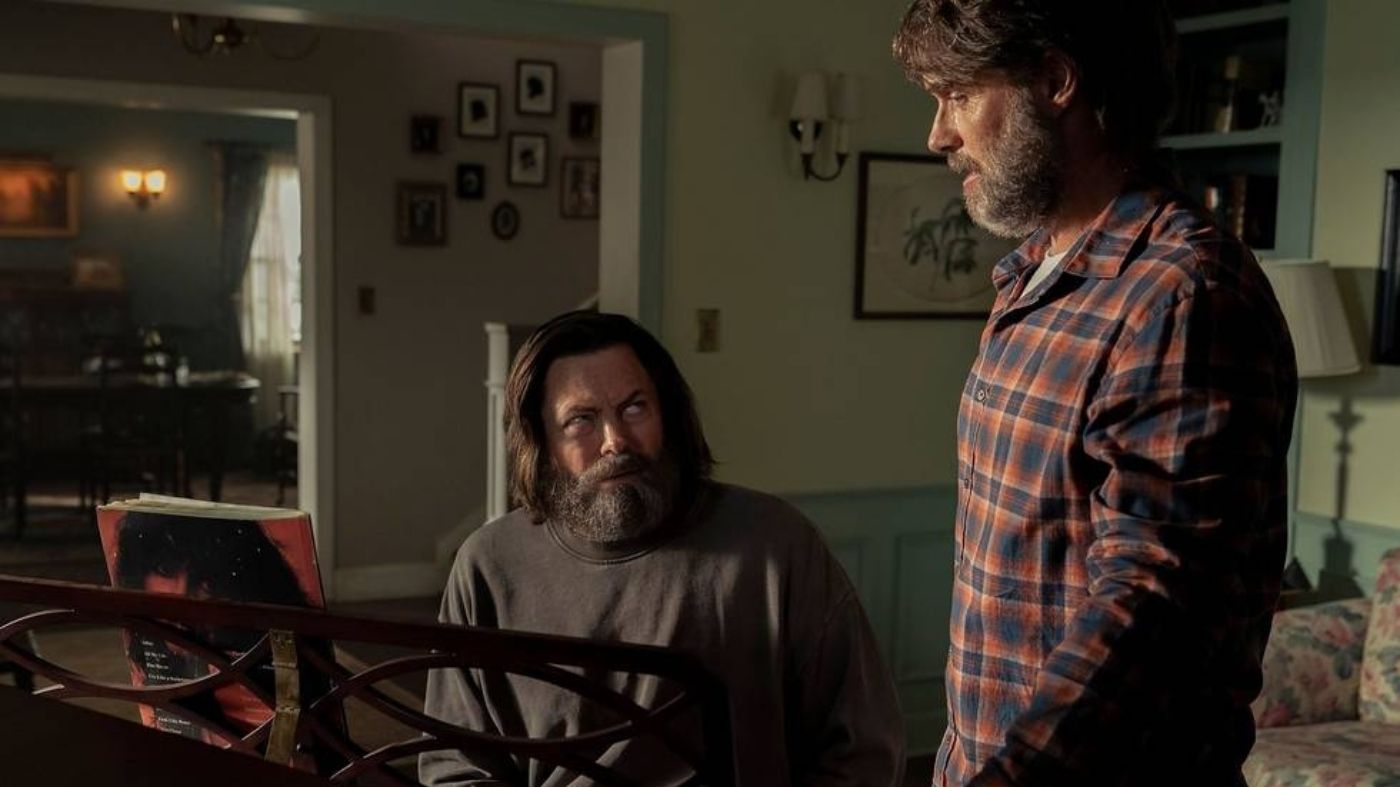Editor's note: The following contains spoilers for The Last of Us Episode 3.Episode 3 of HBO’s The Last of Us just gave us one of the most heart-wrenching episodes of television, and it did it without any of the gore or high-intensity action usually attributed to these post-apocalyptic “zombie” shows. Instead, the episode, titled “Long Long Time” gave us an unexpected love story in the middle of the apocalypse. Diverging from the video game that the show is based on, this episode explores the backstory between Bill (Nick Offerman) and Frank (Murray Bartlett). Bill has been preparing for the apocalypse since before the cordyceps infections. When the apocalypse does come, he is more than thrilled to spend the rest of his life alone in his abandoned, fortified town. That is until Frank, a survivor from Baltimore, comes to his doorstep seeking help. Although Bill initially seems to be a curmudgeon, his loneliness and humanity inevitably get the better of him.
Throughout the rest of the episode, we see Bill and Frank make a life with each other, culminating in a tragic, Romeo and Juliet-style ending. If their story alone didn’t make your eyes water, then the music probably did. Specifically, the music that plays during Bill and Frank’s final moments together is Max Richter’s “On the Nature of Daylight,” a more than appropriate piece of music for their sendoff.
Music Plays an Important Role in Bill and Frank's Relationship
Although the episode is framed by Joel (Pedro Pascal) and Ellie’s (Bella Ramsey) continued journey after the death of Tess (Anna Torv), the main portion of the episode spends a substantial amount of time on the emotional development between Bill and Frank. Music, ironically, plays an important part in their relationship. Frank instantaneously gravitates towards Bill’s piano, on which Frank begins to play “Long Long Time” by Linda Ronstadt (the namesake of the episode’s title). Bill jumps in to sing along, and the two fall in love. As tender as their first “date” is, the rest of their relationship doesn’t go as smoothly. Years later, Frank longs for some social interaction, inviting Joel and Tess over to a fancy lunch party, much to Bill’s chagrin. Later, as Joel had warned Bill, strangers and looters come to their doorstep, which leads to Bill’s injury.
But the most tragic event in Bill and Frank’s love story is towards the end of the episode, when Frank develops a debilitating illness and needs a wheelchair to get around. Although Bill has kept up with taking care of his partner, even he is starting to show his age. Frank comes to the conclusion that because his cancer isn’t going to get any better, it is better for him to die so that Bill can live the rest of his life in peace. This is where Richter’s music comes in, through a montage of Bill and Frank’s last day together. Bill takes Frank on a ride one last time around town before they are suited up for their own private wedding. The music leads up to their last dinner together, mirroring their first meeting many years ago — only now they are gray-haired and weathered. Both Bill and Frank take a sip of their wine, which is drugged and meant to kill them in their sleep. Although it was only meant for Frank, Bill decides that he would rather die in his now-husband's arms than live without the love of his life in the apocalypse.
Episode 3's Song Has Been Used in More Than Just 'The Last of Us'
For score junkies, Richter’s “On the Nature of Daylight” is more than just a familiar piece of instrumental music. It’s a notable series of strings that instantaneously elicit tragedy and melancholia. Its use in this latest episode of The Last of Us achieves just that. It’s no wonder why other films and television series have used the piece to influence similar emotions in audiences. For example, in Shutter Island, the music plays when Leonardo DiCaprio’s Teddy Daniels longs for his deceased wife Dolores (Michelle Williams) in a dream vision. In Arrival, the music plays in a multi-timeline ending montage depicting the tragic story of Amy Adams’ Louise Banks and Jeremy Renner’s Ian Donnelly, whose lives become intertwined during an alien invasion but ultimately culminate in their daughter’s death. Elsewhere on television, the music is featured in Season 4, Episode 9 of The Handmaid’s Tale in a touching reunion between Elizabeth Moss’s June, Max Minghella’s Nick Blaine, and their daughter Nichole. Furthermore, Moss also stars in the music video made specifically for Richter’s “On the Nature of Daylight.”
In many ways, music is just as important as the story being told, and the tragic twist between Bill and Frank’s fates at the end of Episode 3 reflects the same tragedy felt through Richter’s music. Especially when a series is based on a widely popular and acclaimed video game, it’s important for a show like The Last of Us to differentiate itself from what came before. However, by using music from other cinematic and critically acclaimed properties like Shutter Island, Arrival, and The Handmaid’s Tale, The Last of Us makes it clear that the show is not a direct rehash of the video game but a live-action adaptation that should be taken seriously and is worthy of prestige.
The third episode of The Last of Us departed from the video game in more ways than one. Not only did the writers give Bill and Frank a true love story that was missing from the game, but the show also took liberties with its music choices. Although the original theme and some other leitmotifs from the video game are used in the series, as composed by Gustavo Santaolalla, David Fleming joins Santaolalla in composing a new score for the live-action adaptation. But even between Santaolalla and Fleming, the inclusion of Max Richter’s “On the Nature of Daylight” further demonstrates how willing and able the creators behind the show are in departing and subverting expectations. Perhaps this is a lesson for other creators who want to adapt video games into live action. The success of The Last of Us isn’t in its fidelity to the video game but in its commitment to finding the best way to tell the story in live action. In this particular instance, Max Richter's melancholic "On the Nature of Daylight" was the right choice in bringing Bill and Frank's love story to a close.


